The Sense and Sensibilities of Michael Foley
Designer Michael Foley's ethos of simplicity and functionality is contrary to the opulence that underscores so much of Indian design. Probably why his entrepreneurial venture in the corporate world h


Michael Foley is unfazed by the constant blare of vehicles and the rattling and chuffing of passing trains. The incessant noise of a city on the go seeps through the walls of his office, but it barely registers in his mind. The designer has eschewed Bangalore’s posh central business districts of MG Road and Lavelle Road to set up his studio and office in the nondescript neighbourhood of Richards Town. His workplace overlooks Bangalore East railway station.
The clutter-free and simple interiors are a reflection of the man: Reserved and meditative, bordering on shy. The 43-year-old could easily pass off as a corporate manager who spends his time huddled in front of Excel spreadsheets and PowerPoint presentations. There is nothing about Foley that screams ‘I am one of India’s most successful industrial designers’. Not his clean-shaven appearance. Not his buttoned-down pink-tinged shirt, which he’s teamed with a pair of formal cotton trousers.
After spending more than a decade with Titan Company Ltd (formerly Titan Industries), where he is credited with designing the hugely popular Titan ‘Edge’ and ‘Fastrack’ watches, he set up his own design studio, Foley Designs, in 2006. And over the last eight years, the Bangalore-based designer has stamped his aesthetic sensibilities on a body of work which, more likely than not, has a place in many Indian homes, sometimes even without their owners’ knowledge. Foley has designed water purifiers for Hindustan Unilever and the understated but elegant packages for ITC’s Fiama Di Wills range of personal care products. He has built an impressive client list, which includes Microsoft, Godrej, HP, Wipro and Mindtree. He also conceptualised and created the baton for the 2010 Delhi Commonwealth Games. “For the baton, I chose a symbolic route and used soil collected from every state to represent a fragment of India,” says Foley.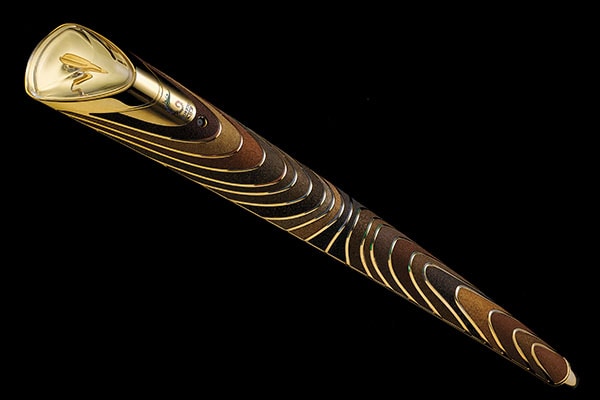 The 2010 Commonwealth Games baton
The 2010 Commonwealth Games baton
It is this attention to detail that attracts clients to Foley, and has earned him the praise of former colleagues. HG Raghunath, chief executive officer, watches and accessories, Titan Company, with whom Foley worked closely between 1994 and 2006, credits him with being an integral part of Titan’s initial design journey. “He would always seek inputs and feedback from his team and other departments to understand consumer insight, and that connected well with the business. He has the potential to contribute to various aspects of designing and not just the product. He is talented and gifted,”
says Raghunath.
After graduating from National Institute of Design, Ahmedabad, in 1994, Foley moved to Bangalore, home to HMT and Titan, where he could use his skills to design watches. “I did my final project with Titan while at NID and later got absorbed into the company,” says Foley.
During his decade-long stint at Titan, he was best known for his contemporary watch designs. “I started experimenting with typography, proportion and scale, which are essential elements for any kind of design. At the time, Xerxes Desai was the vice chairman and managing director of Titan. He saw designing from a problem-solving perspective and that helped me widen my understanding as a designer,” says Foley, who draws inspiration from the early works of French designer Philippe Starck and Americans Charles and Ray Eames.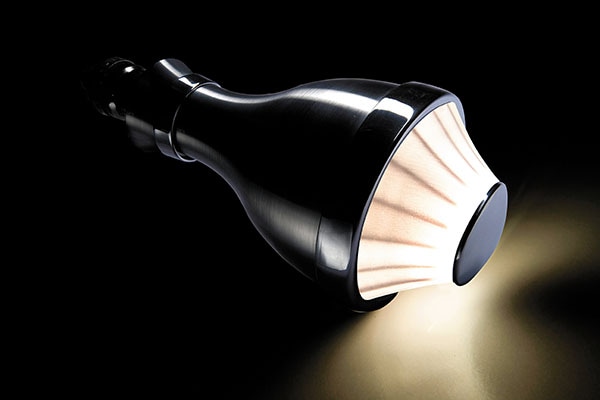 Light touch: A wireless acoustic device
Light touch: A wireless acoustic device
Though the designer left Titan to branch out on his own, there’s no denying the impact of his time in the company. Water-colour sketches of his initial work for Titan occupy pride of place on the entrance wall of his studio. And while his portfolio has expanded, Foley’s ideologies—simplicity and functionality—remain unchanged. This mantra is reflected in his take on the cumbersome shopping cart and trolley. Foley’s version is a two-wheeled stroller-like cart with a sleek and lightweight frame that allows bags to be hooked to it and can easily be manoeuvred onto escalators and stairs. It’s being tested at a few malls in Bangalore, and the designer has filed for a patent for it. Foley is in talks for a tie-up with malls and super-market chains across the country.
“Simplicity in building ideas and shaping things bring about a purity that is a lot more intuitive as a solution. It also makes adaptability to ideas and concepts far easier from a consumer standpoint,” says Foley, adding that “less can solve a lot more”.
Design is in Foley’s DNA. As a toddler, he would watch his father, Lieutenant General (retd) Neville Foley, paint with oils during his free time. (The 78-year-old retired army officer, who is now director at Foley Designs, still paints in his free time.) “My father loves painting landscapes. And my mother [Caroline] is interested in wildlife and portraits, though she doesn’t paint anymore,” says Foley, who began experimenting with water colours at four.
The streak of practicality which colours Foley’s design took root during his years at school. “I was interested in understanding the human body, in particular the muscular form. I also had a keen interest in nature, and refraction and reflection. I used my sketching ability to record these aspects,” he says.
As an ‘army’ child and second of four brothers, home was wherever his father was posted. He has lived in Mhow (Madhya Pradesh), Fazilka (Punjab), Jaipur (Rajasthan) and Secunderabad (Telangana). “The constant travelling helped me develop flexibility in my thinking. I’m not rigid about any practice, and design is all about change and challenging yourself. Travelling helped me develop my designing skills as I was exposed to India’s cultural fabric,” says Foley.
This ability to experiment has shaped Foley’s entrepreneurial streak. He may have begun with Foley Designs, but today, the company is just one of three under the Foley Group. The other two entities are Foley Innovations—which was founded last year and works on design concepts and prototypes like the shopping cart—and TLV Solutions (2011), which works with clients right from the inception of a product to its execution. It was TLV that set up some of the installations at Bangalore’s Kempegowda International Airport (furniture for the curb-side visitors’ area, information desks and check-in stations) and did the interior design for Orion Mall, one of Bangalore’s most exclusive shopping hubs.
The original business, Foley Designs, offers consultancy services across research, product design, packaging and branding. Its advisory board includes industry stalwarts such as former chief executive (lifestyle) of Retail Reliance, Bijou Kurien, who is also on the strategic advisory board of L Capital Asia, the private equity arm of French luxury conglomerate LVMH. (Neither Kurien nor L Capital Asia are investors in the Foley Group.) 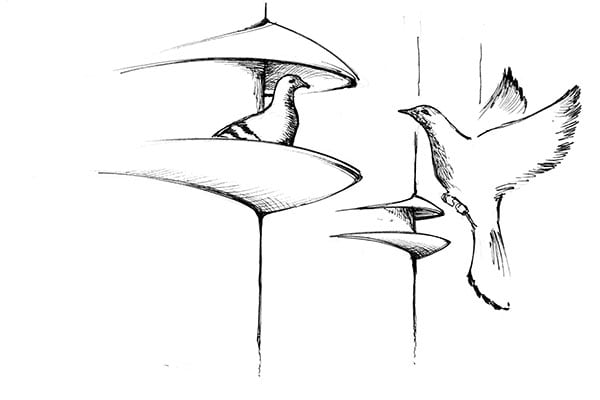 Inclusive design—integrating nesting in buildings to help birds survive in urban jungles
Inclusive design—integrating nesting in buildings to help birds survive in urban jungles
Foley is reluctant to discuss the financial health of his company—“It’s too early to talk about it”—but he admits that his family plays a pivotal role in the company. His wife, Tabita Mathew, who used to run ground operations for British Airways at Bangalore airport, is the director of TLV Solutions. “We got married in 2009, and have a four-year-old daughter, Vivienne,” he says. His oldest brother Nevin, 45, is director of Foley Innovations, and the youngest, Nigel, 39, is head of operations at Foley Designs. The fourth brother, Neil, 41, is a designer with Titan. “My family is my best critic and the key driving force for my success,” says Foley.
Behind his reticence is a man who is driven to push the boundaries and move beyond his comfort zone. Not satisfied with what he has accomplished catering to corporate clients, the designer is now wooing individuals through an online lifestyle product brand, Tilt, which sells home décor items such as cake stands, tea-light holders and snack platters on tiltstore.in. Foley launched Tilt—a self-funded venture—in August this year, under TLV Solutions.
As director of TLV, 42-year-old Tabita is scanning prospective partners for distribution and marketing of the company’s products. This is new territory for the Foleys, and the decision to enter the already saturated lifestyle market was not made in haste. The designer and his team started creating prototypes of the products they wanted to retail only after a year-long research. Foley works primarily with wood, ceramic, glass, marble and metal, and prices range from Rs 500 (candle holders and table calendars) to Rs 10,000 (modular room screens and dividers with light installations). Here, too, the products echo his fascination with functionality and simplicity in art. 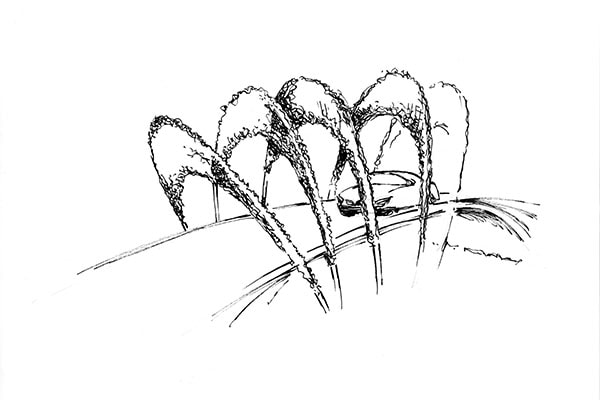 Furniture systems that seamlessly integrate in an environment and provide engaging experiences for a passerby
Furniture systems that seamlessly integrate in an environment and provide engaging experiences for a passerby
The designer and his wife are working to ensure that their new brand stands out in the market. There are plans to have an offline presence in retail outlets at Bangalore, Mumbai and Delhi. It’s early days yet, but they are hoping to tie up with Amazon India. The ecommerce giant has already roped in Foley to curate its online watch store. “Michael is an authority when it comes to understanding watches. His immense knowledge about watches will deconstruct technical jargon into consumer language and will aid in informed buying decisions,” says Vikas Purohit, category leader and GM-apparel, Amazon India.
It’s not just clients and former employers who sing Foley’s praises. He’s won the respect of other entrepreneurs in the retail space. Kunal Rohit Sachdev, managing director and CEO, Caravan Craft Retail, credits Foley with business acumen, a trait not very common to designers.
“Foley is among the few designers to understand the commercial viability of a product in terms of the price point at which it needs to be sold. While putting together a product line for us, his consumer insights and innovative designs resulted in a price band that clicked with customers,” says Sachdev.
But despite a litany of consumer-driven set-ups, Foley’s heart lies elsewhere: Public spaces.
He is working on a series of initiatives where public spaces such as traffic management systems and waste disposal can be redesigned to meet the growing demands of urbanisation.
His initial sketches and concepts show that need and aesthetics are not mutually exclusive. “I believe in common underlying design principles irrespective of the type of product or experience. It’s a holistic experiential outcome of any design intervention, be it a logo, product or a space. The drive to bring unique design experiences consistently motivates me,” he says.
Foley wants to introduce sustainability in design. For instance, last year, he installed solar street lamps outside Orion Mall. This is part of his pilot project for Bangalore-based real estate company Brigade Group to introduce rechargeable solutions on the streets.
“Elements in public design must also serve a core purpose of existence from a utility perspective,” he says.
His street lamps are custom-made to “suit specific architectural expressions”. Unlike in typical solar panels that use up a lot of space, Foley has seamlessly integrated battery packs at the top of the lamps to prevent pilferage. Keeping the structure modular and easy to assemble, the materials used are resilient to the weather conditions.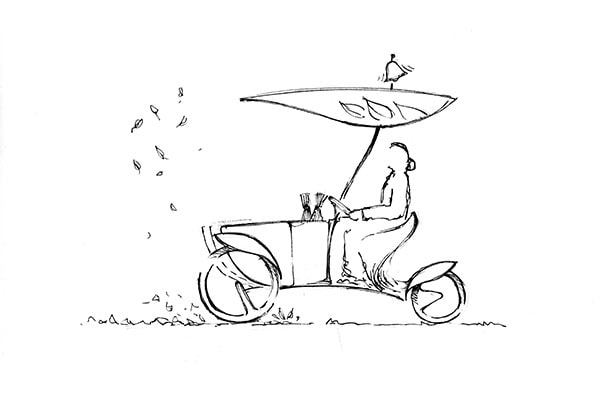
Mobile waste collection designed to suit Indian conditions, using materials resilient to wear and tear
The 45-member team at Foley Designs is also working on an in-house initiative for traffic management. They are building an intelligent and intuitive prototype to ease chaotic traffic during rush hours.
“It’s a system that can preempt the flow of traffic, convert two-way lanes in to one-way lanes, basically creating solutions that are easily adaptable,” says Foley. The prototype is being developed as a concept, and he needs “external support” to take it to the market. “I will soon open up such initiatives to any organisation willing to support the cause in terms of partnership or funding.”
Bangalore-based architect and urban designer Naresh V Narasimhan, who advises the local government on urban design, says that Foley’s interest in public projects is an encouraging trend. “He is a multi-talented designer with an extensive range in terms of design intervention. All designers should give five percent of their time to public projects as it helps them to grow and expand their design capabilities,” says Narasimhan, managing partner and principal architect, Venkataramanan Associates, which is involved in designing the revamp of Bangalore’s KR Market.
Even though public space design is a huge and fulfilling opportunity, getting a project is a challenge as it involves multiple stakeholders at the government level, and a change in mindset. “The government can play a fundamental role in the deployment of high-quality design experiences and in changing the way consumers respect and value our public spaces,” says Foley.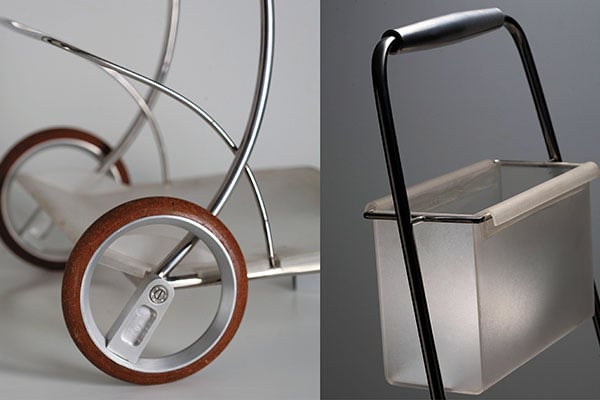 Shop art: Foley’s version of a cumbersome shopping trolley is a two-wheel stroller-like cart with a lightweight frame
Shop art: Foley’s version of a cumbersome shopping trolley is a two-wheel stroller-like cart with a lightweight frame
He might have earned his fame as a designer, but Michael Foley is far more: He is an artist who is true to his art an entrepreneur who built a company from scratch a businessman who is always looking for new and profitable markets an urban planner who has a vision for the city he and his family have grown roots in. He is not the man he was when he started out at Titan.
The past eight years have revealed both, the brickbats and the bouquets, in the world of design. He’s had to learn that design is not just about how a product looks. It’s also about assembly lines, manufacturing costs and, of course, marketing. “The design studio itself is just a nominal part in the whole process,” says Foley.
For a man who wears so many hats, shoes—whimsically enough—represent the ultimate design challenge. “I would love to design shoes. I feel shoes require a very sophisticated form of designing. They need great detailing and yet a simple look for the foot, which is a complex form in the human body.”
Foley, as is his wont, will find a simple solution for this too.
First Published: Oct 14, 2014, 07:17
Subscribe Now(This story appears in the Feb 19, 2010 issue of Forbes India. To visit our Archives, Click here.)